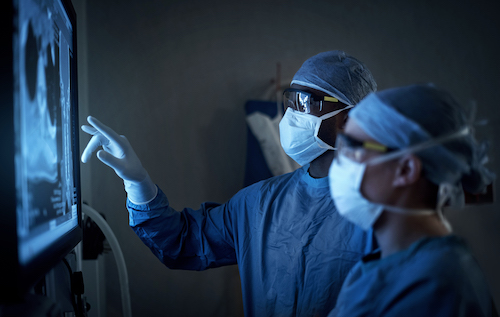
New Brunswick, N.J., September 12, 2021 – Venous thromboembolism (VTE) refers to blood clots in the veins, which is a serious yet preventable medical condition and is often seen with advanced cancers. Researchers at Rutgers Cancer Institute of New Jersey explored the impact of VTE during surgery for renal cell carcinoma (RCC), also known as kidney cancer, in a cohort study of patients undergoing elective surgical resection for a cancerous kidney mass.
Results of the work are being presented as a poster at the American Urological Association (AUA) 2021 Annual Meeting in Las Vegas, Nevada by presenting author Hiren V. Patel, MD, PhD, Rutgers Robert Wood Johnson Medical School urology resident, along with senior author Eric A. Singer, MD, MA, MS, FACS, FASCO, associate chief of urology and director of the Kidney Cancer Program at Rutgers Cancer Institute, and associate professor of surgery and radiology at Rutgers Robert Wood Johnson Medical School. They share more about the work:
Why is this topic important to explore?
Studies in other cancers have shown that VTE prior to surgery is associated with worse morbidity and mortality. The impact of preoperative VTE on outcomes after kidney surgery remains to be understood.
Tell us about the work and what you and your colleagues found?
The study compared the outcomes among patients with and without VTE prior to nephrectomy, which is the surgical removal of one or both kidneys. The study demonstrates that patients who have preoperative VTE prior to nephrectomy have increased likelihood of minor and major complications. Mortality was 103 percent higher among patients with VTE prior to nephrectomy compared to those without VTE. Likewise, patients who underwent nephrectomy preoperative VTE had a 30 percent higher likelihood of readmission, increased operating room time, and higher direct hospital cost than patients without VTE.
What are the implications and next steps related to this work?
Given the outcomes from the time a patient enters surgery to the time they are discharged, this study highlights the need for preoperative screening for VTE and the potential utility of the chemoprophylaxis, or the use of medication to prevent VTE among patients undergoing kidney surgery. The potential role of chemoprophylaxis prior to kidney surgery remains to be evaluated.
Along with Drs. Patel and Singer, other authors on the work are Joshua Sterling, MD, and Arnav Srivastava, MD, MPH, Rutgers Robert Wood Johnson Medical School; Thomas L. Jang, MD, MPH, FACS, Miral S. Grandhi, MD, and David A. August, MD, Rutgers Cancer Institute of New Jersey and Rutgers Robert Wood Johnson Medical School; Saum A. Rahimi, MD, Rutgers Robert Wood Johnson Medical School; Benjamin I. Chung, MD, Stanford University Medical Center, and Steven L Chang, MD, Harvard Medical School.
###
For journalists – contact:
Krista Didzbalis
Media Relations Assistant
732-507-8307
krista.didzbalis@rutgers.edu
For patient appointments/inquiries – contact:
844-CANCERNJ (844-226-2376)

